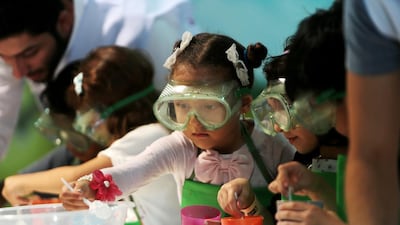Who can tell what the sparks of interest generated at this year’s Abu Dhabi Science Festival might lead to? Some parents will probably have brought their children to this event because it is a fun and educational day out, but for some bright young minds, this might be the moment when they discover an interest and aptitude in science that could lead to as-yet-unimagined breakthroughs for the benefit of humanity.
Getting children interested in the so-called Stem – science, technology, engineering and mathematics – subjects is, of course, just the first small step in this process, even if it is a crucial one. As Abu Dhabi Education Council director general Dr Ali Al Nuaimi explained, this interest needs to be encouraged and nurtured at school so that each child can reach their potential at university and in their working lives.
As any parent will be able to attest, what captures the attention of one child will not necessarily have the same effect on another, which is why the range of activities at the festival has to be as broad as possible. This year there are 67 activities at the festival, a 20 per cent increase on the year before, and 40 per cent of the content is sourced from the UAE. These include everything from the Smartphone Microscope station, in which a USB microscope zooms in on the fibres of tweed fabric, to a microplanes workshop, where children learn about the science behind aviation and get to build – and launch – their own model airplane.
Participation by schools is up too, with 15,000 students from government and private schools expected to attend, a 50 per cent increase on 2015. Total visitor numbers are expected to be considerably more than the 110,000 who attended last year.
The wider question is what happens once we have inspired this new generation of burgeoning scientists and they get to graduate level and beyond. This country is a long way off leading the world in either funding of research and development or in the scale of the research being conducted. As Dr Saeed Al Hassan, an Emirati faculty member at the Petroleum Institute, told The National last month: “A lot of undergraduates are not exposed to research”. If students whose interest is piqued by events like the science festival are to truly reach their potential, this has to improve.
The UAE space programme is an example of a Stem project that can inspire a new generation, just as Nasa’s Moon landing programme energised an earlier generation – something from which the United States continues to reap the benefits. We need to do the same, and it starts with capturing children’s imaginations.

